Jean-Marc SOREL
accueil > Intégralité des débats > SESSION 3
SESSION 3
version originale bilingue - tout en français - tout en anglais
Thème de la session : Le procès : l’établissement de la preuve
Vendredi 10 Juillet 2009, 9h – 12h30
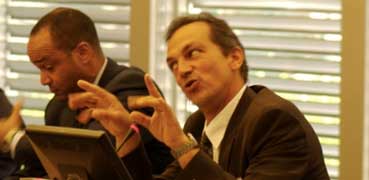
Président : Jean-Marc SOREL
-
contribution 01 - SOREL Jean-Marc

all the session in: version originale bilingue français english
transtlated version
Dear friends, with your leave, we will enter into this new session. And, as you can see, I am completely isolated. The isolation of power, as one can say. Now, the little power I have today is to give out the floor, speaking time, to all of us as far as I can. And I just want to introduce myself in about ten seconds because we don’t know ourselves. I am Jean Marc Sorel, as you can see in your programmes. I am a professor at the University of Paris I Sorbonne. Well, I am a law professor, and one of my interests is international justice, in the broadest sense. That is, every year I have the opportunity to organise a study seminar to (...) -
contribution 02 - VANDERMEERSCH Damien

all the session in: version originale bilingue français english
Damien VANDERMEERSCH
transtlated version
Thank you. I am Damien Vandermeersch. I was examining magistrate in the Rwandan cases so called Rwandan cases in Belgium. I worked together with investigators of the ICTR. We have a chiefly civil law system with an examining magistrate who is there and who supervises and organises the gathering of evidence. And in addition to that, we had a lot of requests for judicial assistance from the ICTY, ICTR, to collect evidence in Belgium in the context of passive judicial collaboration from us. So on the issue that is the theme of today, maybe I should raise this difficulty that we faced, because we often had the impression I (...)J.M. SOREL
Thank you. Would somebody like to say something on the use of evidence at trial? Maybe from one side. No side. No side in particular is challenged by that question.
Maybe in some other area that is not entirely related to the use of evidence, but and I turn to André Guichaoua to talk about financial evidence.
-
contribution 03 - GUICHAOUA, André
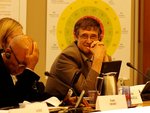
all the session in: version originale bilingue français english
André GUICHAOUA
transtlated version
Very well. I would like to give a specific example which falls in line with what Damien Vandermeersch has just addressed, like in the context of the first trial in Brussels and which I concluded, that is, concluded the case of financial evidence, because it was possible to demonstrate that the funding of militia was done under the basis of direct disbursement from corporate entities which had been syphoned so as to clearly fund the chief of staff of the militia on an individual basis. And this was the case in Butare where I sourced a number of documents, and especially because the minister at the time had every morning contributed to (...)J.M. SOREL
Thank you. That is an issue which was somewhat overlooked yesterday but which is significant.
Is anybody else willing to say something about this point?
-
contribution 04 - ARBIA Silvana
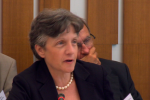
all the session in: version originale bilingue français english
Silvana ARIBA
transtlated version
I am sorry to speak, although I might not be in my proper quarters, but let me point out that in respect of evidence, there is well, the Prosecution has multiple interests. My experience at the ICTR has demonstrated that the Prosecution has to assess the relevant evidence because evidence is what is submitted to the judges. But before deciding whether or not to tender such evidence, it is a decision that weighs on the Prosecution. And judges in the ICTR are not those who are trying to look for the entire truth. They are just trying to ensure that the indictment is properly supported. There is also a strategy because if evidence (...)J.M. SOREL[/fond or
Thank you for that contribution. But let me state that, from an academic point of view, generally speaking I am not speaking for myself the exculpatory or the incriminating search for the truth has been criticised. And in assessing that material on which the Prosecution would rely, there has been the issue of the role of the Office of the Prosecutor. That is from the academic standpoint, that has been highlighted, and I believe we are going to discuss that under the procedural model, and I believe the ICC on that point has kind of learned the lesson of that inequality of arms, as it were.
Yes, Ms. Conde.
-
contribution 05 - CONDÉ Aïcha
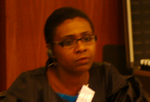
all the session in: version originale bilingue français english
Aïcha CONDE
transtlated version
Yes. I would like to pick on what Ms. Arbia has stated but from the angle of the frustration of the Defence, because you have the raw evidence and you say we do not have the obligation to disclose to Defence, but there is no obligation to investigate in an exculpatory matter, and there is an obligation to make disclosures to the Defence, and practice has shown that that does not happen. There was a decision taken in 2008 when, two years after the end of the Prosecution case, it was revealed that the Prosecutor had kept evidence for 8 years without disclosing to the Defence. And to me, it has been a source of frustration because I (...)J.M. SOREL
Very well. We are in a general discussion now, and I believe that Barrister Muna has something to say.
-
contribution 06 - MUNA Bernard Acho
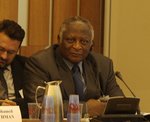
all the session in: bilingual original version français english
Bernard MUNA
original version
President, I want to approach this question from the angles of the parties to the trial. I believe that the Tribunal concentrated too much on the accused persons and forgot that there were other parties. And I ask this question: Is the society, the society whose values, whose tranquillity has completely been broken and destroyed, is this society not a party to the process in this particular context? Are the victims, in fact in Rwanda we neglected the victims for quite a while, are the victims not a party to the process? Then we forget the witnesses. In this particular case, in your investigation, your are concentrating on the guilt of (...)J.M. SOREL
Merci pour ces témoignages et ces remarques très intéressantes qui continuent en quelque sorte d’alimenter la question du modèle.
Dans le procès, il y a beaucoup de choses importantes, il y a des preuves. Tout à l’heure, André Guichaoua disait : « Quand même, une preuve, c’est mieux qu’un témoignage », un mauvais témoignage ou même un bon témoignage. Je voudrais justement m’intéresser maintenant aux témoins, parce qu’on en parlera à plusieurs reprises. Je compte revenir ensuite sur la Défense.Mais je souhaitais éventuellement donner la parole à Madame Becky parce qu’elle s’occupe de la protection des témoins et je pense qu’elle peut nous apporter des informations sur la manière dont les témoins ressentent le procès et la manière ou l’importance de ces témoins dans le procès.
Si vous le souhaitez, j’aimerais que vous vous exprimiez sur ce point-là, mais ce n’est pas obligatoire, encore une fois, c’est comme vous le souhaitez.
-
contribution 07 - BECKY Sylvie
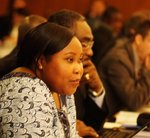
all the session in: version originale bilingue français english
Sylvie BECKY
transtlated version
Thank you, Professor Sorel. I am Sylvie Becky. I am in charge of the section of Witness and Victims Support at the ICTR. Our prime duty is to ensure the production of witnesses to Arusha or to the Hague for the purposes of their testimony before the Court or Tribunal. And that dispatch is done with states’ cooperation. As you are aware, the Tribunal does not have a territory of its own. We have an agreement with the host country, namely, Tanzania, which supports us very much in our work. But those witnesses reside in different countries, including Rwanda. To bring them to Arusha, these witnesses have various statuses. Some of (...)J.M. SOREL
Thank you for this very interesting contribution. I am not going to open a Pandora’s box in respect of alpha witnesses and detainee witnesses. I think that we also have confusion of testimonies. But before that, I have a little paper stating that Ms. Dior Fall and Mr. Stewart are willing to take the floor.
-
contribution 08 - FALL Dior
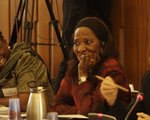
all the session in: version originale bilingue français english
Dior FALLL
transtlated version
Very well. I had wished to speak before Defence Counsel Aicha Conde to state that the Prosecutor, in respect of evidence, we also work on exculpatory evidence and disclose under Rule 68. But the issue is, who has the authority to rate evidence as exculpatory evidence. So I believe that the onus lies with the Prosecutor. So I would like to state that we disclose evidence under Rule 68. The fundamental issue is, who is in a position to determine the exculpatory nature of that evidence.J.M. SOREL
Thank you for that specification. Mr. Stewart.
-
contribution 09 - STEWART James
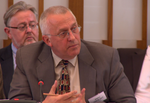
all the session in: bilingual original version français english
James STEWART
original version
I just wanted to say in response to what Aicha Conde was saying that there is, in fact, as far as I am concerned, a control by the Judges. It exists now. The system that we’ve got can be made to work because if the Prosecution fails in its very serious obligation to communicate elements to the Defence that are helpful to the Defence, the Defence has a recourse to the Trial Chamber. That’s the control it exists. In the sort of system that you see at the ICTR, there is a very powerful obligation on the Prosecutor to communicate to the Defence elements that would be of assistance to the Defence. That is the responsibility that the (...)J.M. SOREL
Alors, la parole est à la Défense. En tout cas, Jean-Marie Biju-Duval a demandé la parole, je la lui donne.
-
contribution 10 - Biju-Duval Jean-Marie
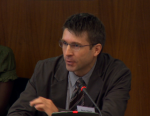
all the session in: version originale bilingue français english
Jean-Marie BIJU-DUVAL
transtlated version
Thank you. My name is Jean Marie Biju Duval. I am a lawyer in Paris. I was a Defence lawyer in the Media trial, and now I am a Defence counsel for Lubanga in the ICC trial. And since we were trying to draw lessons from the transition from ICTR to ICC, I would like to speak along the lines of Ms. Becky’s statement and the statement made by Mr. Stewart in respect of a crosscutting issue which spans several areas. The issue of the secrecy in terms of protection of witnesses, the issue of secrecy of confidentiality in respect of testimonial evidence, and the matter of confidentiality is pretty sensitive. And it had been in the ICTR, and (...)J.M. SOREL
Thank you very much for highlighting that particular aspect.
Well, I have a number of people asking me to give them the floor. So, please, just keep it brief.
-
contribution 11 - REYNTJENS Filip
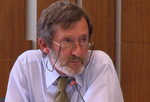
all the session in: bilingual original version français english
Filip REYNTJENS
original version
Thank you. I have a question. Evidence at the ICTR is mostly on the basis of testimony. Now, there is a concept that is widespread: the issue of false testimony or perjury. I have a question for all the stakeholders that face this problem. Prosecution and Defence are on their own, witnesses and the witnesses of the other side. How is this issue managed? How should it be managed, the issue of false testimony, which to me is quite important?J.M. SOREL
Nous y reviendrons peut-être, mais avant, je vais donner la parole à Monsieur Kwende, dans l’ordre des demandes.
-
contribution 12 - KWENDE Alfred

all the session in: bilingual original version français english
Alfred KWENDE
original version
Thank you, Mr. Chairman. I thought I should complete somehow, from my own standpoints, the information communicated by the head of witness and victim support section at ICTR. I am head of investigations at ICTR. Before Prosecution witnesses reach the courts, they are handed over by investigators. There is so a protective front to witnesses that goes on before that stage. And not every witness from whom a statement has been recorded actually goes to court. So those witnesses need persistent and constant attention. The tendency is to forget that aspect of it. In fact, if we look at the Rules of Procedure and Evidence at ICTR, Rule 34, (...)J.M. SOREL
Merci. On sait que les catégories se multiplient. Puisque, comme vous venez de l’expliquer, il y a aussi des témoins, disons, dont il faut s’occuper presque socialement, c’est-à-dire en prendre soin et éventuellement se déplacer. Madame Ayodeji Fadugba ?
-
contribution 13 - FADUGBA Ayodedji
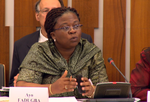
all the session in: bilingual original version français english
Ayodeji FADUGBA
original version
Actually, I was going to talk about the issue of exculpatory evidence which Ms. Conde raised. It is only to say that even after the judgement in the OTP, there are findings on the record. We still have a team that will go through the judgement and look at what we have in our databases to see if there are exculpatory elements that do not go with what was found in the judgement so that we could make disclosure to the Defence. I think the jurisprudence has expanded to the point where we can safely say that as we look for inculpatory information, we are also looking for exculpatory information. I wanted to add that. Following Mr. Duval’s (...)J.M. SOREL
La seule certitude qui émerge c’est qu’il s’avère assez compliqué effectivement dans la situation qui est celle du Rwanda d’obtenir des témoignages et une protection de témoins suffisante.
Je vais laisser donc laisser la parole, successivement et pour de brèves interventions je précise, tout d’abord à André Michel Essoungou et, ensuite, à François Roux et, enfin, à Roland Amoussouga.
-
contribution 14 - ESSOUNGOU André-Michel

all the session in: version originale bilingue français english
André-Michel ESSOUNGOU
transtlated version
André Michel Essoungou is my name, and I was a journalist at the time of the events. So I just wanted to add something to what Mr. Duval said from the standpoint of the journalist that I am working for two years in the life of the Tribunal at the time when not many persons were present in Arusha in the world media. Confidentiality, as I understand, confidentiality with regard to witnesses and the trial proceedings is important, but to the journalist and to the public, what it has led to, that it is impossible to follow the proceedings. I remember that I covered the proceedings from the beginning, the opening statements of the (...)J.M. SOREL
François Roux, you have the floor now, maybe not to address that issue.
-
contribution 15 - Roux François
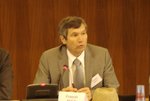
all the session in: version originale bilingue français english
François ROUX
transtlated version
Thank you. It is a very important issue, but I just want to make two points regarding witnesses, and since we are here to make assessments, I would like to say here publicly that I am grateful I would like to express the gratitude of my team towards to Sylvie Becky and what she said. We have found that section to be extremely professional. So, you know, I don’t always hold back my criticism, as you will see in the second part of my statement, but I think we should pay tribute to those who do this work. Unfortunately, it did not prevent, unless we know my neighbour here knows it too. It does not prevent the fact that when (...)J.M. SOREL
Thank you. It wasn’t as wicked as you made it sound.
Mr. Amoussouga, you have the floor -
contribution 16 - AMOUSSOUGA Roland
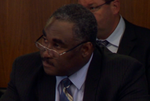
all the session in: version originale bilingue français english
Roland AMOUSSOUGA
transtlated version
Thank you very much. I just wanted to add that the issue of witness protection is quite new with respect to the context of the ICTR. And to this day, the context is still a challenge to the proper functioning of the activities of the ICTR. That is why I would like to point out here that not only was the issue not properly mastered at the time the ICTR started operating, because states had to be educated on the concept, but also the concept was weakened by the paucity of resources. Witness protection does not just happen. It comes with a cost. Unfortunately, the resources placed at the disposal of the ICTR does not enable it to (...)J.M. SOREL
Thank you. Mr. Webster, and maybe Mrs. Fall afterwards.
-
contribution 17 - WEBSTER Don
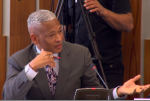
all the session in: bilingual original version français english
Don WEBSTER
original version
I think in some respects the witness protection regimes in the ICTR have not caught up to the changes in the global situation of witnesses introduced by Gacaca in Rwanda. In a context where Gacaca forces everyone to testify without any sort of protection, it makes the way we’ve approached witness protection in the ICTR out of pace with global developments in managing witnesses of genocide. If witnesses can testify without protection in Rwanda, I don’t see why the same regime can’t be introduced in the ICTR. Witness protection issues impact upon some of the questions that Madam Conde raised, which is our ability to go through our records (...)J.M. SOREL
Il y a donc une proposition assez provocatrice : pourquoi ne pas supprimer la protection des témoins ? pourquoi pas ? Je résume évidemment d’une manière assez grossière, ne vous inquiétez pas. Madame Fall ?
-
contribution 18 - FALL Dior

all the session in: version originale bilingue français english
Dior FALL
transtlated version
Thank you. My name is Dior Fall. I wanted to say something about witness protection. And when I heard my friend Michel, AndrÈ, the journalist, say that it was too confidential, that one could not just know what was happening, but I think it’s a matter of principle. It is really very important to know whether the witness is entitled to protection or not. There are witnesses who come and say, "I don’t want any protection. I want to testify in full view." That doesn’t bother us. But others, depending on the problems they may face and the risks that they incur. I mean, he mentioned that some went home and got imprisoned, and this is across the (...)J.M. SOREL
Thank you, Madam Fall. Sorry for mispronouncing your name.
This is all very interesting, I mean, the divide between providing information and protection.
Now, I will ask all of you to be very brief. But we are now entitled to a coffee break. So we will just take a few speakers.
Mr. Lurquin and a few other persons.
-
contribution 19 - Lurquin Vincent
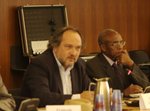
all the session in: version originale bilingue français english
Vincent LURQUIN
transtlated version
First point, Mr. Stewart said something about disclosure by the Prosecutor, that is, exculpatory material. It is not up to the Prosecutor to know what material the Defence wants. Well but it is difficult for the Defence to state what they want if the Prosecutor says he does not know. So the discussion is very difficult, not only for coffee that is waiting. The Chamber has decided in the Ndindiliyimana case that the Prosecutor failed in his obligations and forced the compelled the Prosecutor to disclose, but that it was coming late. Because even if the Prosecution witnesses have to be recalled, it would be difficult to cross (...)J.M. SOREL
Thank you.
Madam Becky, I think you are happy to have come.
-
contribution 20 - ARBIA Silvana

all the session in: version originale bilingue français english
Silvana ARBIA
transtlated version
Everybody knows the value of witness protection, but nobody knows the kind of protection that both parties can implement, that is, preparing examination in chief and cross examination and continuous closed session. That is a means of protecting witnesses and protecting the rights of witnesses and using witnesses in the manner that is kind of different. You cannot use other evidence the way you use witnesses. There is another issue that may be interesting. In the ICTR system, we have had experience of ^proofing a possibility for the parties to talk to the witness before he gives his evidence. So this is impossible in the ICC system, and (...)J.M. SOREL
Thank you.
Mr. Haguma. And after that, maybe a sentence from the other speaker.
-
contribution 21 - Haguma Jean

all the session in: version originale bilingue français english
Jean HAGUMA
transtlated version
Yes, briefly, I am not against witness protection, but I just wanted to underscore a disadvantage to witness protection on the ground. I am a lawyer based in Kigali. The fact that one is protected on one’s heel, the witness’s name is not known, his trial is not known, and this is an incentive for the witness to make a false testimony. This is important because there is a lot of false testimony because people know that there will be no consequences. People would not even know what he testified to. Now, maybe I will end by saying that I do not agree with my friend about what he said about the Gacaca, but we are not here to talk about (...)J.M. SOREL
Well, I don’t think it is completely out of the discussion. But, last speaker before the coffee break.
-
contribution 22 - ESSOUNGOU André-Michel

all the session in: version originale bilingue français english
Jean-Michel ESSOUNGOU
transtlated version
Two points to reassure Ms. Fall. No, journalists do not take the light in doing all this. There is an important thing I think for all stakeholders in this justice. It is the public character of the proceedings, the right of the public to know. When the UN Security Council adopted the resolution to create the ICTR and said it should contribute to reconciliation, I don’t see how the Court can function without Rwanda seeing what is happening. So if there are journalists, as is my case, who say that the proceedings should be made more open, it is not to to help in this direction, otherwise we will go off to some other facet. I don’t (...)J.M. SOREL
Thank you. We will now break off for coffee and resume at 11:00.
(Recessed at 10h36) -
contribution 23 - SOREL Jean-Marc

all the session in: version originale bilingue français english
(Begenning : 11.05 am)
Jean-Marc SOREL
transtlated version
My friends, if you are ready, we will continue with our meeting discussions. And while we are settling down, I have an announcement to make to some of you. Those of you who spoke yesterday should have before them the transcripts of their statements, two page record. If you can kindly look at that document before lunch and possibly ensure the accuracy of that document. Please do not look at the nitty grittys. And I’m told that the English copy will be ready at 12 o’clock. And you would only need to concern to the publication, rather, of the document. After this morning’s session, I hope this session will be as lively and active as the first (...) -
contribution 24 - APTEL Cécile
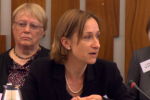
all the session in: version originale bilingue français english
Cécile APTEL
transtlated version
Thank you. Very briefly, let me simply state that several persons deplored the fact that the ICTR as well as the ICTY never allowed the victims to participate in the proceedings as victims and to be a part of a civil case and everywhere dealing only with the common law aspect. The criminal law has been truncated, and the issue of victims was raised. And it had a greater impact than has been acknowledged, namely, failing to give the victims any place in the proceedings, as well as giving them a window for them to voice their opinions. So not only the victims are not recognised, the issue of compensation has never been addressed, and less (...)J.M. SOREL
Thank you very much. But let me make an observation. We might also want to look at the improvements made by the ICC.
Yes, François.
-
contribution 25 - Roux François

all the session in: version originale bilingue français english
François ROUX
transtlated version
Let me say a word on the victims. I was among those who deplored the fact that victims were not given access to the ICTR, and that has happened at the ICC, and Jean Marie is in a better position to speak about that. And that access has been given to Cambodia. In Cambodia these are victims are several parties, so they are more active. And that has been opened, but the management is still to be determined. In the first trial before the Tribunal in Cambodia, there are 93 victims, which is not massive, but which is adequate. And since in that tribunal the Defence teams have a national defence counsel and an international defence counsel. So (...)J.M. SOREL
Yes, Jean Marie Duval, a supplement
-
contribution 26 - Biju-Duval Jean-Marie

all the session in: version originale bilingue français english
Jean-Marie BIJU-DUVAL
transtlated version
Yes, it’s a thought which I have heard in respect of the early experience of the ICC. The problem relates to the critical mass, and the specific issue is the place of the victim in our proceedings relating to crimes committed on a mass scale. In such proceedings there is a high number of victims, 20,000, 100,000, 800,000. And, therefore, that brings to the fore the participation of the victims and kind of changes course. And it is therefore important to defend the personal interest of the victims. If you have 300 or 1,000 victims represented by a counsel, how do you make a distinction between defending the victims and the duty of the (...)J.M. SOREL
Thank you. I note that what is sometimes criticised, namely, the non considering of victims and the ensuing issue of compensation is not specific to the ICTR. And from what you have said, it has not been resolved yet in the ICC, which has accorded someplace to the victims.
-
contribution 27 - Lurquin Vincent

all the session in: version originale bilingue français english
Vincent LURQUIN
transtlated version
Let me say a word. I have chosen to work at the ICC but with the victims, and it is not it is central to have legal representation, because you have counsels, and regarding the victims, you have a legal representation without any mention to counsels. Victims at the ICTR normally had to be victims. At the ICC the victims ought to have had to their own say. They should have their own identity in respect of the OTP. And the issue we discussed yesterday about prosecutions must be different if the victim is represented and is allowed to participate and to have a say in the proceedings. And I believe that is a daunting challenge. And Ms. (...)J.M. SOREL
I think we cannot delve any further in the issue of victims and compensation.
But I think we have to say a word or two about that and raise the issue, and that issue seems to be a technicality, but it is fundamental, especially in the proceedings. And this is the issue of translation. And this is somebody who has a paper, very interesting, dealing with translation issues is Alphonse.
Alphonse, you have the floor.
-
contribution 28 - MPATSWENUMUGABO Alphonse
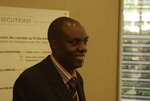
all the session in: version originale bilingue français english
Alphonse MPATSWENUMUGABO
transtlated version
My name is Alphonse Mpatswenumugabo. Before I joined the ICTR, I used to work with the newspaper Jeune Afrique and I travelled widely. So I’m going to dwell on the role of the interpreter in trials before the ICTR. I am going to discuss specifically the Kinyarwanda interpretation booth. Let me start off with recruitment. When the ICTR opened its doors, there were initially French and English interpreters, but then immediately it was realised that there was a need for persons speaking Kinyarwanda, given the genocide. Otherwise, all the officials in Rwanda were either killed or had fled the country. And, therefore, there was virtually no (...)J.M. SOREL
Thank you very much. I do apologise for shortening your presentation. Maybe it’s because we have a short time to say a lot of things. But I really wanted you to say something because I think the interpretation is something fundamental. And, as you said, almost all the witnesses speak neither French nor English and usually Kinyarwanda. So your contribution is fundamental. And you’ve mentioned in your paper that you were worried about the abolition of certain interpretation posts. You did not actually say so, but you wrote it in your paper.
-
contribution 29 - Roux François

all the session in: version originale bilingue français english
François ROUX
transtlated version
Maybe a word or two about what Alphonse said because it is a major problem before your international tribunals. I would like the appraisal of these Tribunals to factor in that difficulty that was so well expressed but which unfortunately has still not been addressed before the Tribunals, I must say. When Aïcha Condé and myself were part of a small group of experts with Bruno Cathala, the president and registrar of the International Criminal Court, we attended a seminar organised especially by the interpreters, and they told us, "Listen, when we speak well and properly when there is interpretation, we lose between 20 and 25 % of what we (...)J.M. SOREL
Thank you. I think your message was properly understood and received.
Mr. Kwende, I believe, wants to say something briefly. Then we will move on to the another topic.
-
contribution 30 - KWENDE Alfred

all the session in: bilingual original version français english
Alfred KWENDE
original version
I just thought that what Alphonse said was very important. It reinforces one of the challenges I was going to express along the way. That is, at the court level most of the documents are generated by investigators. Put yourselves in the position of an investigator in Rwanda. Most of our international staff, they don’t speak Kinyarwanda and they have to use Kinyarwanda speaking Rwandans to do interpretation. Their job is beyond interpreting words. It’s also interpreting the culture into the statements that are recorded by witnesses. And believe you me, most of the sense is lost, or we spend more time trying to get into the frame of (...)J.M. SOREL
J’en profite pour remercier les personnes qui sont en haut, dans cette cabine, et qui font un très bon travail.
Madame Ngendahayo, que j’aurais d’ailleurs pu interroger sur les victimes, pardonnez-moi, je vous laisse la parole. Ensuite, nous passons à un autre thème, c’est promis.
-
contribution 31 - NGENDAHAYO Françoise
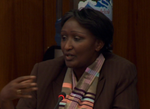
all the session in: version originale bilingue français english
Françoise NGENDAHAYO
transtlated version
Thank you, Mr. Chairman. I just want to highlight what the interpreter said by citing I had the privilege of following the Akayesu case some time ago, where a victim, a witness, was unable to mention what’s related to sexual violence because of the sensitivity of the translation in her language. In that case, an inadequate interpretation may slow down the trial. For instance, in the Rwandan culture, the word "sexual violence" may be interchangeable with the word "marriage". A woman, on whom sexual violence is exercised, may actually say "I was married." So it took some time for people to understand the slight differences. So, as Mr. (...)J.M. SOREL
Thank you, Madam, for those important explanations. I did not know them. I found them very interesting. Giving insight on the different possible meanings, and the consequences on the indictments.
Now, we are not going to put the Defence in the dock, but from the various papers I have read, the Defence appears to be attacked. Now its role is to defend. Now, why have they been attacked? I believe there is some ethical problem here, not individual ethics, but collective ethics and a common code of conduct. It would appear that the Defence is blamed for not having a comprehensive code of conduct. I’m only reflecting the opinion in the various papers.
Yesterday Ms. Condé mentioned the issue of negationism, which could be finally related to the role of the Prosecutor. It would appear that there is a problem on that score. There is also the problem of the stress between the perfect culprit and the one who wants to be cleared at all costs. What the defence attorney is supposed to do: searching the truth or clearing his client?
What is the relationship between what I may call a “Vergès” syndrome. That is a well known Defence attorney who would do everything he could to clear his client, event if he has to borrow a shocking attitude.
About the Defence, there is also an important point mentioned in the paper of Roland Amoussouga about this memorable judicial decision in June 2006 admitting legally the existence of the genocide. The work might have been easier if this had been realised before. Be that as it may well there are other problems.
I wanted to give the floor to Madam Florida Mukeshimana, with her leave, of course. In her paper she mentioned an interesting testimony. I may summarise it by saying that maybe it is virtually under attack, but I would like her to explain further. Madam, please.
-
contribution 32 - MUKESHIMANA Florida
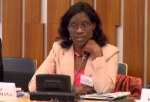
all the session in: version originale bilingue français english
Florence MUKESHIMANA
transtlated version
Thank you, Professor. My name is Florida. I’m a survivor of the genocide and the political massacres in Rwanda in 1994. And I must say that from the creation of the Tribunal, the ICTR, I express a desire to testify before the Tribunal. I wrote in number of letters from friends to ICTR, to the United Nations, to any other institutions to testify to what I witnessed. So I was summoned by the ICTR 12 years later on and I replied positively, because I considered it my duty to testify. But from coming in from Brussels I was a bit afraid. I wanted to be protected. So this brings me back to the issue of protected and unprotected witness. And we (...)J.M. SOREL
Thank you, madam, for your testimony, which I find moving. Maybe I’ll give the floor to the Defence this time to defend itself. It is not mandatory.
Madame Condé?
-
contribution 33 - CONDÉ Aïcha

all the session in: version originale bilingue français english
Aïcha CONDE
transtlated version
I would like to answer Florida. I believe that the first difficulty that you faced was the legal system in which you testified. In your system in Rwanda and in my system the witness testifies. He comes. He knows what he has to testify. He testifies. Nobody interrupts him. Then he may be asked questions of enlightenment, questions to explain further from the Tribunal through the Presidents. Now, questions are put to you and the opposite party cross examines you to have clarification or to test your credibility. What you went through, Defence witnesses also go through it in the same way as you do. And I don’t think it has to do with your (...)J.M. SOREL
Well, I believe the Prosecution is now becoming the Defence and vice versa.
Madam Migeot.
-
contribution 34 - MIGEOT Valérie
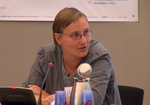
all the session in: version originale bilingue français english
Valérie MIGEOT
transtlated version
I would like to revisit what Florida said. I will not talk about the aspect before the Tribunal, but the aspect of contact with the witnesses, by either the investigator or a representative of the OTP in Arusha. What I can say generally is that there is a qualitative difference in the persons who appear before us and who need assistance in Belgium. Well, it is not my domain to mention the recruitment of persons in the international institutions, but what I do as a representative of the Belgian state is to calm down and prepare the victim, to prepare them and to make them understand their status as victim. I know the strategy and (...)J.M. SOREL
Thank you for that testimony. Mr. Muna, briefly, please.
-
contribution 35 - MUNA Bernard Acho

all the session in: bilingual original version français english
Bernard MUNA
original version
I shall be very short. I just wanted to say that the problem raised by the witness is not solved by the recognition that this system is like this or this system is like this. I think that one of the good things that come out of here is to recognise that we must build a system that will bring a proper enquiry to bring out the truth and at the same time respect the dignity. I think the story of this Rwandan lady is sad. To say that the system allowed it is not a comfort to her. That’s why, as I said to my English speaking friends, I saw that the inquisitorial system maintained a balance between all the witnesses and maintained a (...)J.M. SOREL
Vincent Lurquin, André Guichaoua et après, vraiment, je laisse la parole aux Juges. Je suis vraiment désolé, mais je voudrais qu’ils s’expriment.
-
contribution 36 - Lurquin Vincent

all the session in: version originale bilingue français english
Vincent LURQUIN
transtlated version
Please bare note that I know my Defence colleagues have ever had the intention of attacking witnesses. It also relates to the legal system. The common law system which we are not quite used to in Brussels the system is different and indeed it is more respectful of the integrity of the witness in common law. But what you have said is important but I can’t speak in your stead that would be the worst of things. It boils down to stating indeed there is no room for the victim in the proceedings. That is what you have said. That is your say so. You have said that you have written several times for 12 years to say you were a victim and that you (...)J.M. SOREL
Yes, let us admit your point. André Guichaoua.
-
contribution 37 - GUICHAOUA, André

all the session in: version originale bilingue français english
André GUICHAOUA
transtlated version
I was about to the speak to Judges but since with Alison Des Forges. I am the witness who has testified the most in a trial I testified for five weeks running and twice and I don’t think there are many persons who have done same. But let me say that one of the accused persons, a lady for that matter collapsed because of intense its of the proceedings and the lawyer collapse and the last same thing happened to me that was 10 minutes after the end of the trial. But let me say that the Judges shoulder responsibility in the length of the trials in the violent nay tour of interactions in the heated or lively nature of proceedings. I’m not going (...)J.M. SOREL
And that is a smooth transition to me because if we were to look at the question it wore boil down to should a judge be more adversarial, should the judge better exercise control of the proceedings or get involved in the investigations that is what we discussed yesterday and this morning the issue of procedural model used or applicable in the ICTR which is Anglo Saxon based model which is a stepping stone for the ICC and accordingly in the various statements Vice President Khan made some as well as judge Arrey who listed all a flurry of problems in respect of the procedure in place in the ICTR such as lack of default judgements and other issues. So vice president if you wish to say something about this point please feel free.
-
contribution 38 - KHAN Khalida Rachid
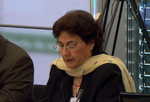
all the session in: bilingual original version français english
Juge Khalida Rachida KAHN
original version
Thank you very much. I will start by greeting Mr. Chairman, Honourable President, Honourable Judges, Mr. Prosecutor, Mr. Registrar, and all distinguished guests present here. Before I proceed to present my paper, I would like to make a small brief observation on the comments made by Madam Florida and Aïcha Condé. We are very vigilant, very attentive when we are in the court, very much concerned about the witnesses, especially the victim witnesses. We would not allow the Prosecution to put any question which would traumatise the witness. We would not allow the Defence to cross examine the witness beyond the limits of cross examination. (...)J.M. SOREL
Merci, Madame la Vice-présidente. Peut-être Madame la Juge Arrey, Monsieur le Juge Short, je ne sais pas. Vous intervenez peut-être pour synthétiser également vos propos.
-
contribution 39 - ARREY Florence Rita
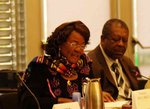
all the session in: bilingual original version français english
tags
Civil law vs Common law - Position of victims in proceedings - witnesses - Protection vs PublicitéJuge Florence Rita ARREY
original version
Thank you very much so that Judge Short shouldn’t start. Thank you, Mr. Chairman. I just wanted to say that after the Akayesu case, Media case and the Kambanda Case, in December last year the Tribunal also came up with another landmark where it was held that music could constitute genocide. In the Bikindi case, the Court found that in three compositions of Bikindi, the lyrics in those songs were used during the genocide, that is, from April to June, RTLM played the songs with comments from the journalists. Because of the message conveyed, because of the words that were contained in the lyrics and the comments made by the journalists, (...)J.M. SOREL
Merci beaucoup, Madame, pour ce témoignage haut en couleurs, avec quelques exemples, mais aussi des choses évidemment très sérieuses comme la question du jugement par contumace. C’est vrai qu’une juridiction internationale vient effectivement d’être créée — le Tribunal spécial pour le Liban —, avec la possibilité de juger par contumace. Mais si j’avais un peu d’humour, je dirais que, peut-être, le problème sera qu’ils ne jugeront « que » par contumace. Mais c’est un autre problème.
Le Juge Short voulait peut-être dire quelque chose. Je ne ferai pas un mauvais jeu de mots en disant qu’il faudrait être bref !
-
contribution 40 - SHORT Emile Francis
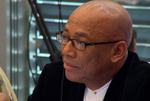
all the session in: bilingual original version français english
Juge Emile SHORT
original version
I will try to be brief. I had indicated to the organisers that I was going to speak on the legacy and impact of the Tribunal. But I realised that it will sound more like an academic discourse, and so I have abandoned the idea. I just wanted to talk about the common law or civil law system based on a lot of the observations that have been made in the course of the day and especially yesterday. I was trained as a common law lawyer. And I came to the Tribunal, you know, steeped in the common law tradition. But having sat in some of the highly complex multi‑accused trials trials, which involve a lot of events and a lot of issues, I am (...)J.M. SOREL
C’est une remarque très intéressante et ce qui sera le juste mot de conclusion. Je constate que les Juges eux-mêmes sont tout à fait conscients des améliorations nécessaires dans la procédure, c’est un point extrêmement positif.
Alors, Arusha serait-il un contre-modèle et le modèle serait-il le Tribunal pour le Cambodge ? J’ai entendu aussi des choses pas toujours très positives sur le Tribunal sur le Cambodge.
Nous sommes un petit peu en retard, mais nous avons commencé un peu en retard. En tout cas, ma mission est terminée.
Je suis vraiment désolé auprès de tous ceux que j’aurais pu frustrer dans leur temps de parole, mais j’ai essayé de faire en sorte que tout le monde puisse s’exprimer le plus possible et sur tous les thèmes. Donc, maintenant, nous allons déjeuner et je vous remercie beaucoup.
(Suspension de séance: 12h45)
(Recessed at 12h45 pm)

